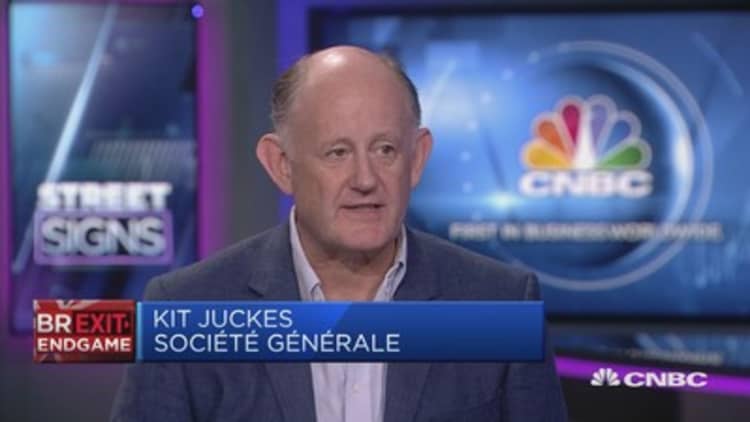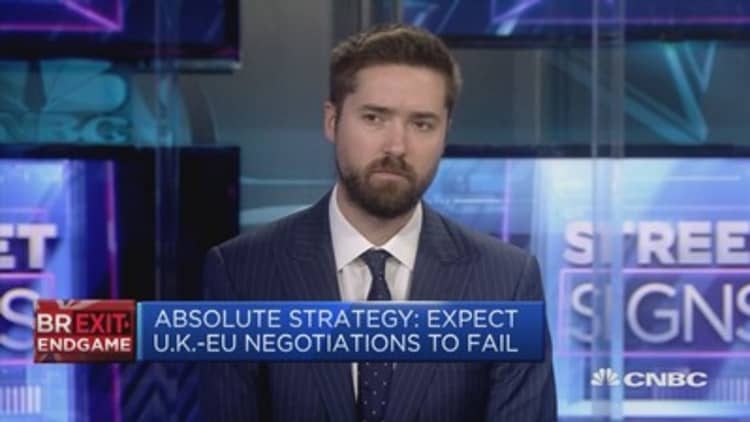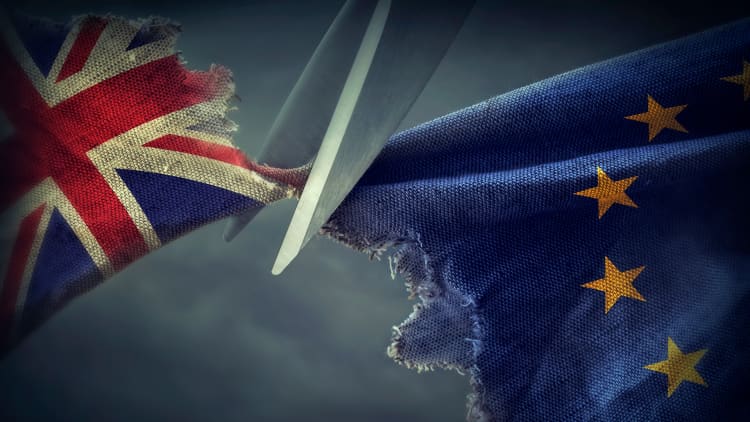Sterling rallied on Wednesday morning after U.K. lawmakers voted to seize control of the parliamentary agenda from the government, moving closer to blocking a no-deal Brexit.
At around 12:00 p.m. London time, the pound rallied nearly 1 percent to trade slightly above the $1.22 level, after having fallen as low as $1.1958 during Tuesday's session, its lowest since a flash crash in October 2016.
Members of Parliament (MPs), including 21 members of Prime Minister Boris Johnson's own ruling Conservative party, defeated the government by 328 votes to 301 on Tuesday night to seize control of parliamentary business and bring forth a bill to block a no-deal Brexit.
This could see the U.K.'s deadline for leaving the bloc extended to January 31, thwarting Johnson's "do or die" plan to leave on the current October 31 deadline with or without a deal in place.
All 21 Conservative members who voted against the government were expelled from the party, including two former finance ministers and the grandson of iconic wartime Prime Minister Winston Churchill.
Another Conservative MP, Phillip Lee, left the party to join the pro-EU Liberal Democrats, leaving Johnson's government with no working majority in the House of Commons.
In response to the defeat, Johnson said he would ask MPs to support plans for a snap general election on October 15, but needs a two-thirds majority in order to do so, and main opposition Labour party leader Jeremy Corbyn ruled out supporting the early election unless the possibility of leaving the EU without a deal was taken off the table.
Currency strategists on Wednesday struck slightly different tones as to where these developments take the outlook for the pound.
'Welcome to the Twilight Zone'
Stephen Gallo, head of European FX strategy at BMO Capital Markets, told CNBC Wednesday that the GBPUSD resurgence in light of Johnson's parliamentary defeat, and the fact that lawmakers opposing no-deal will also try to block elections, tells us that there is "volatility in the volatility."
"The ball is now back over into Johnson's court again. What will his strategy be for circumventing these attempts to undermine the government? While asking this question, speculative shorts are trimming their short-GBP exposures," Gallo said.
"The irony of this all is that the worse the position that Remain MPs put the country in vis-à-vis its Brexit negotiating stance, the more the pound rallies. Welcome to the Twilight Zone."
Gallo maintained that GBP is still trapped in a "lose-lose" scenario until Brexit or the results of an election are resolved. BMO strategists believe that the currency is cornered to the downside by the combination of slowing global and eurozone economic growth and the many possible permutations involving either the U.K. leaving without a withdrawal agreement, early elections, or both.

Kit Juckes, global head of FX strategy at Societe Generale, told CNBC Wednesday that sterling is "bumping around very close to, but not making, a new all-time trade-weighted low in nominal terms."
"It has kind of reached the lows we were at in 1992, the lows we were at in 2008, the lows we were at on that flash crash, and we're not breaking through at the moment," he told CNBC's "Squawk Box Europe".
"If you take no-deal off the table forever and say we either get a deal or we don't leave, I think you still have more upside for sterling than downside and the market still has more bad news priced in than good news."
How much hard Brexit risk is priced in?
A key ongoing question is what exactly markets have already priced into the pound, given the various possible manifestations of the U.K. leaving the EU solely on World Trade Organization (WTO) terms, let alone with a trade deal.
Berenberg economists have determined fair value for sterling versus the euro in an orderly Brexit, i.e. with a withdrawal agreement in place, at 1.20. However, in the event of a no-deal departure with no transition period, sterling could fall to parity against the euro in the short term, according to Berenberg senior economist Kallum Pickering.
"Based on the current sterling-euro rate of circa 1.10, we calculate that the market sees a roughly 50% probability of a hard Brexit," Pickering said in a note Wednesday.

"We put the risk of a hard Brexit at 40%. Recent developments and the outlook for UK politics tilt the risk to our call to the upside."
While the pound has gained a brief reprieve, the unpredictability of British politics could still facilitate further declines. Since the U.K.'s European Union referendum bill was unveiled in the queen's speech in May 2015, sterling has fallen by around 26% against the euro and 29% against the dollar.
"By comparison, trade-weighted sterling dropped by circa 27% peak-to-trough during the financial crisis of 2007-2009," Pickering commented.


